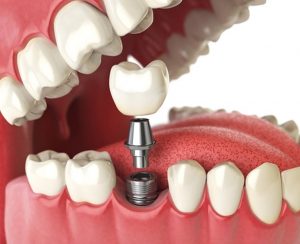Dental Implants
Dental implants are titanium screws that are placed in the jawbone with the aim of achieving aesthetics and functions in partial or complete tooth deficiencies and defects. This treatment option is preferred by millions of people over the world. The implants that are used today are being developed on the basis of biological and biomechanical principles with the latest technological advances, and their success has been proven. The five-year success rate of implants is reported as 98% in the literature. In comparison to conventional treatments, the advantages of implant treatment are removing the necessity of damaging healthy adjacent teeth in bridge restorations, helping protect the jaw structure and bone texture, enabling fixed treatment instead of removable treatment and providing the full retention of moving dentures. Individuals may be eligible for dental implant treatment based on the detailed examination by their dentistry specialist. In this process, planning is made by considering many criteria. An ideal implant patient is generally one with an anatomically adequate bone structure under the control of the systemic condition and informed about the treatment.
At the operating stage, the implants are placed under aseptic conditions and local (regional) anesthesia which is the same as the anesthesia applied to the patient during normal tooth extraction. Then, routine surgical procedures are performed. The implant fusion time to the bone is 3-5 months on average, which may vary from patient to patient. Following the fusion period, operations like a normal prosthesis continue, and the patient ends up with new, aesthetically pleasing and functional teeth. This is a long-lasting treatment when performed by qualified practitioners and good patient care.


Working Hours
- Mon-Thu 08:00 - 20:00
Friday 07:00 - 22:00
Saturday 08:00 - 18:00
Contact Info
- +90 (850) 303 8 303
- info@alarahealthgroup.com







